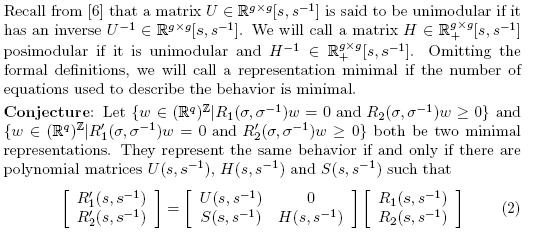Problem 1.9
A Farkas lemma for behavioral inequalities
A. A. (Tonny) ten Dam
Information, Communication and Technology Division
National Aerospace Laboratory NLR
P.O. Box 90502 , 1006 BM Amsterdam
The Netherlands
J.W. (Hans) Nieuwenhuis
Faculty of Economics
University of Groningen
Postbus 800, 9700 AV Groningen
The Netherlands
1 DESCRIPTION OF THE PROBLEM
Within the systems and control community there has always been an interest in minimality issues. In this chapter we conjecture a Farkas Lemma for behavioral inequalities that, when true, will allow to study minimality and elimation issues for behavioral systems described by inequalities.

Based on the static case, one may expect that such a relation should be the extension of Farkas’s lemma to the behavioral case. This leads to the raison d’tre of this chapter.

2 MOTIVATION AND HISTORY OF THE PROBLEM
In the early nineties the first author started to investigate minimality issues for so-called behavior inequality systems,
e.g., systems whose behavior ![]() allows a description
allows a description ![]() Examples can be found in [2].
Examples can be found in [2].
The first publication that we are aware of that deals with this class of systems is [1]. And the conjecture mentioned above can already be found in that paper. As the problem proved hard to solve, a number of investigations where carried out in the context of linear static inequalities, where the problem of minimal representations of systems containing both equalities and inequalities was solved [2]. The conjecture, however, withstood our efforts, and it became a part of the Ph.D. thesis of the first author [2]. As the study is placed in the context of behaviors, the Farkas lemma for behavioral inequalities is also discussed in the Willem’s Festschrift [3] (chapter 16).
Until the Farkas lemma for behavioral inequalities has been proven, issues like minimal representations, elimination of latent variables etcetera cannot be solved in their full generality. It is our belief that the Farkas lemma for behavior inequalities, as conjectured here, will be a cornerstone for further investigations in a theory for behavioral inequalities.
3 AVAILABLE RESULTS
For the static case, the conjecture is nothing else than the famous Farkas lemma for linear inqualities. For the dynamic case, the conjecture holds true for a special case.

4 A RELATED CONJECTURE
It is of interest to present a related conjecture, whose resolution is closely linked to the Farkas lemma for behavioral inequalities.

BIBLIOGRAPHY
[1] A. A. ten Dam, “Representations of dynamical systems described by behavioural inequalities, ” In: Proceedings European Control Conference ECC’93, vol. 3, pp. 1780-1783, June 28-July 1, Groningen, The Netherlands, 1993.
[2] A. A. ten Dam, Unilaterally Constrained Dynamical Systems, Ph.D. Dissertation, University Groningen, The Netherlands, 1997. URL: http://www.ub.rug.nl/eldoc/dis/science/a.a.ten.dam/
[3] A. A. ten Dam and J. W. Nieuwenhuis, “On behavioural inequalities, ” In: The Mathematics from Systems and Control: From Intelligent Control to Behavioral Systems, Groningen, 1999, pp. 165-176.
[4] J. Farkas, “Die algebraische Grundlage der Anwendungen des Mechanis-chen Princips von Fourier, ” Mathematische und naturwissenschaftliche Berichte aus Ungarn, 16, pp. 154-157, 1899. (Translation of: Gy. Farkas, “A Fourier-féle mechanikai elv alkalmazásának algebrai alapja, ” Mathematikaiés Természettudományi Értesitö, 16, pp. 361-364, 1898.)
[5] W. Rudin, Functional Analysis, Tata McGraw-Hill Publishing Company Ltd., 1973.
[6] J.C. Willems, “Paradigms and puzzles in the theory of dynamical systems, ” IEEE Transactions on Automatic Control, vol. 36, no. 3, pp. 259-294, 1991.
